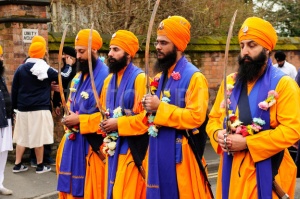Caste: Difference between revisions
From SikhiWiki
Jump to navigationJump to search
No edit summary |
No edit summary |
||
| Line 4: | Line 4: | ||
</center> | </center> | ||
[[File:Panj Pyare (Sikh).jpg|thumb|300px|right|They are known as Khalsa but not Jatt, Nai, Brahmin etc.]] | [[File:Panj Pyare (Sikh).jpg|thumb|300px|right|They are known as Khalsa but not Jatt, Nai, Brahmin etc.]] | ||
'''Caste''' or '''Caste systems''' | '''Caste''' or '''Caste systems''' is a system of social stratification existed in India and many parts of the world. | ||
Sikhism does not endorse caste based distinctions in society that lead to unequal opportunities for some people. In fact, Sikhism completely rejects class or race based distinctions between humans, that leads us to make an inequitable society. Such distinctions have surfaced only due to ill interests of certain section of people, who, on the pretext of making a society more manageable through these classifications, eventually paved the way to an unequal grouping within the human race. | * The concept of Varna may be translated as "class," and refers to the four social classes which existed in the [[Hindu]] society, namely Brahmins, Kshatriyas, Vaishyas and Shudras. | ||
* ''Jāti'' may be translated as caste, and refers to birth. The names of jātis are usually derived from occupations, and considered to be hereditary and endogamous, but this may not always have been the case. | |||
[[Sikhism]] does not endorse caste based distinctions in society that lead to unequal opportunities for some people. In fact, Sikhism completely rejects class or race based distinctions between humans, that leads us to make an inequitable society. Such distinctions have surfaced only due to ill interests of certain section of people, who, on the pretext of making a society more manageable through these classifications, eventually paved the way to an unequal grouping within the human race. | |||
Revision as of 05:50, 28 October 2015
ਜਾਣਹੁ ਜੋਤਿ ਨ ਪੂਛਹੁ ਜਾਤੀ ਆਗੈ ਜਾਤਿ ਨ ਹੇ ॥੧॥ ਰਹਾਉ ॥
(ਪੰਨਾ 349, ਸਤਰ 13, Nanak)
Caste or Caste systems is a system of social stratification existed in India and many parts of the world.
- The concept of Varna may be translated as "class," and refers to the four social classes which existed in the Hindu society, namely Brahmins, Kshatriyas, Vaishyas and Shudras.
- Jāti may be translated as caste, and refers to birth. The names of jātis are usually derived from occupations, and considered to be hereditary and endogamous, but this may not always have been the case.
Sikhism does not endorse caste based distinctions in society that lead to unequal opportunities for some people. In fact, Sikhism completely rejects class or race based distinctions between humans, that leads us to make an inequitable society. Such distinctions have surfaced only due to ill interests of certain section of people, who, on the pretext of making a society more manageable through these classifications, eventually paved the way to an unequal grouping within the human race.

